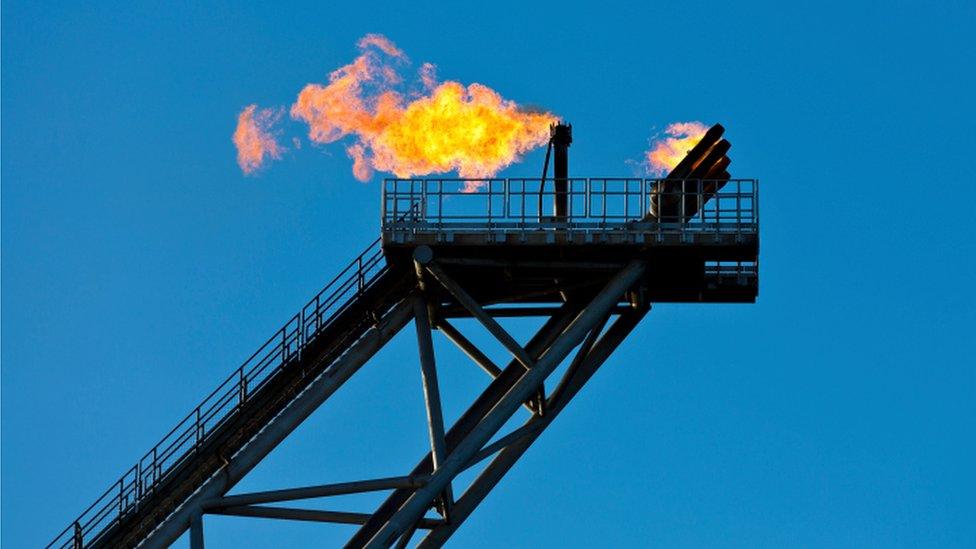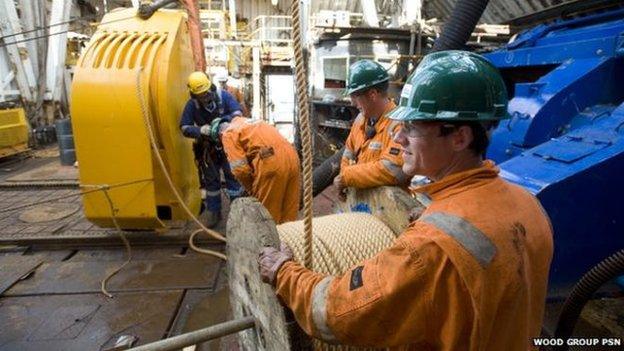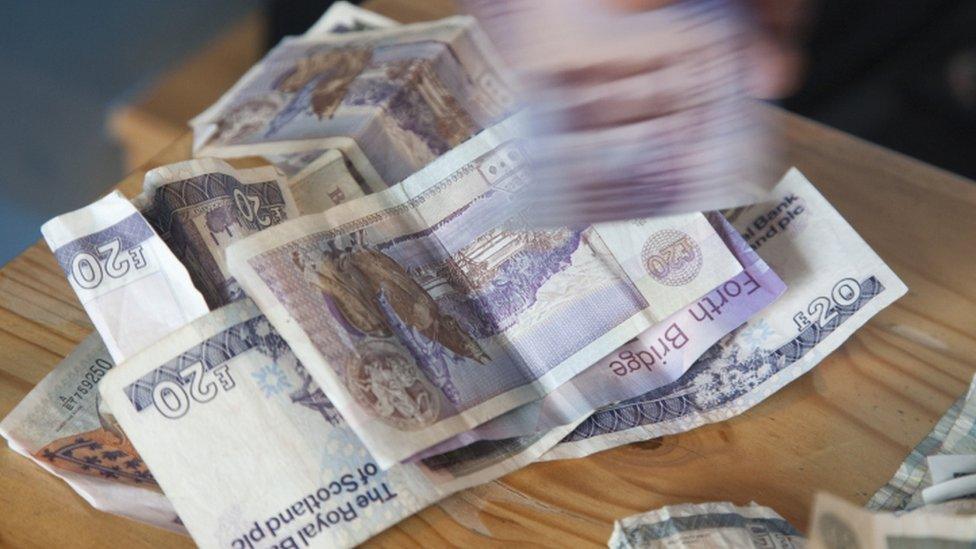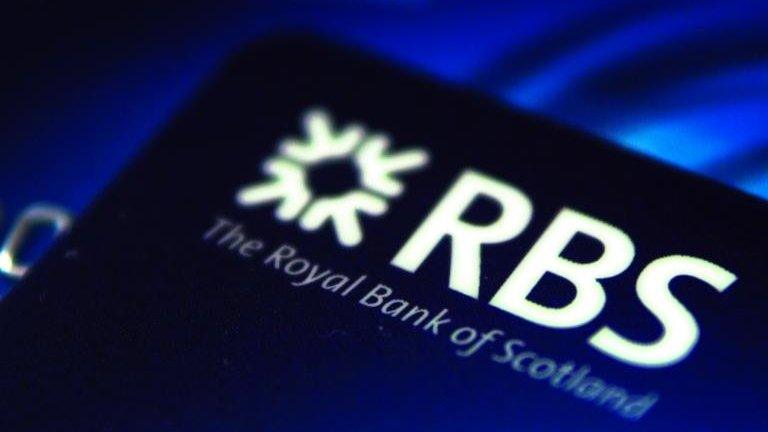Crude awakening
- Published

The price of a barrel of Brent crude oil fell nearly 4% on Wednesday, to $47. It's taking a mighty toll on companies in the sector.
Yet even if the price were to double, we learned today that it would continue to fall a long way short of filling the yawning deficit in Scotland's public finances.
Let's start with the toll on companies. In recent weeks, we've heard January-to-June figures from BP, with profits down nearly two-thirds, and that was before the provisions for its continuing Deepwater Horizon nightmare.
Shell announced profits down 35%, with a $4bn cut in operating costs and 6500 jobs to be axed.
Weir Group, the engineer based in Glasgow has a big footprint supplying North America's fracking industry. It reported a 13% drop in revenue, nearly halving in profit and 32% cut in North American workforce.
This reflected "the most severe downturn in oil and gas markets in nearly 30 years," said chief executive Keith Cochrane.
And Weir led the fall of nearly 2% in the FTSE 100 on Wednesday, with a 5.2% slide in its share price.
This week, we heard from Wood Group, the oil services giant based in Aberdeen. saying it has shed 5,000 jobs worldwide so far this year, 1,000 of them in the UK (it has cut 7,300 since last summer).
There is lots more scything at costs still to come. Revenue is down 20% on last year, and it's not in even in the business of selling oil.
Its chief executive, Bob Keiller, warned of the need to preserve an engineering base as the industry goes through this turmoil and contraction.

Then on Wednesday, we heard from EnQuest. It's an independent, Aberdeen-based and with growing significance as a driller in UK waters. It has two big fields soon to come on-stream; Kraken and Alma/Galia.
Its half-year results showed the high cost of hedging against volatility, while including some interesting insights into the ways the industry is adapting to lower prices.
The big push in UK waters is to get costs down. In a mature field with old equipment, much maintenance and new investment has been required over recent years. So alongside sharply falling output, the cost per barrel has soared.
For Enquest, operating costs reached $45.90 per barrel. That's almost as much as the barrel fetches, and it doesn't include exploration, development and overhead costs. The total cost per barrel to EnQuest, calculated on the basis of how much it would take to replace each barrel in its reserves, was an average of $72.50 last year, and is now down to $63.
In line with others, and encouraged by both the UK government and the new oil and gas regulator, it has cut operating costs to $39 per barrel, and aims to get that down to the low 30s.
Tax bonanza
It is cutting staff costs. New rotas have met resistance from offshore workers unions, but with three week rotas instead of two, there's a big saving in helicopter costs.
The price of transporting oil and gas to market was running at more than $10 per barrel (or gas equivalent), and that has come down to $7.60. That includes a cut to the rates for using Sullom Voe terminal in Shetland.
EnQuest is also saving a lot of money on its tax bill. The impact of the tax incentives announced by George Osborne in his March Budget has allowed Enquest to book a $22m tax credit.
It has sold its Norwegian assets this year, and adds this astonishing observation: "In the current oil price environment, EnQuest does not anticipate paying material UK cash tax before 2025".
If oil companies like EnQuest don't expect to pay tax, because of low profitability, tax incentives and smart accountants, the flip-side of that is that the Treasury can expect to take in less tax. Obviously.
Fiscal affairs
That flip-side is what Fiscal Affairs Scotland has been looking at. Assuming that the question of Scotland's fiscal balance is still of interest after the independence referendum, this small, dogged analyst of public finances has just published its take on the Scottish government's numbers.
Published in June, these consider several scenarios of oil price, production and cost cutting. It comes as no surprise to read confirmation that the out-turns from the past have been well below expectation, and the out-turns expected in the future have been downgraded.

That was to be expected with the lower oil price. But what John McLaren and Jo Armstrong have also shown is the impact of the tax cuts in the March Budget.
They have found that even if the oil price goes back up to $100 per barrel (it was stable at around $105 to $115 until last summer), then the Treasury doesn't get to see much of the benefit.
If production were to rise at up to 4% per year up to 2019-20, which is an optimistic industry forecast reflecting recent investment, that would deliver £600m more in tax.
If efficiency were to hit ambitious industry targets, that would boost profitability, from which the government could take £300m more.
And if the price were to go up again to $100, that would net £1.1bn. If all three were to happen, that might mean £2.2bn more revenue in 2019-20.
That sounds a tidy sum, but it's a long way from recent offshore tax take. And if the debate is returning to the question of an independent Scotland's fiscal balance, then even a triply happy scenario is a long way from plugging the gap.
In the red, still
The calculation is that the worst of the Scottish government's scenarios, with a low oil price and poor production performance, would leave it with an £8.5bn deficit in 2019-20, while the UK government might expect to have a £10bn surplus.
In the best of the scenarios, with the oil price recovered, costs down and production stronger, there would be a £6bn Scottish deficit, compared with a £12.8bn surplus for the UK.
The main difficulty with such models is that the variables are notoriously fickle, particularly the oil price. Fiscal Affairs Scotland suggests the Scottish government's scenario-planning economists could dare to think about a $130 barrel, as well as more downbeat possibilities.
The other problem in modelling is that a low energy price ought be good for households and non-oil businesses. So the rest of the economy would deliver higher tax revenues to counteract the lower ones from offshore oil and gas and its supply chain.
Supporters of independence, in the Business for Scotland grouping for instance, are already acknowledging that the next push for a 'yes' is going to have to downplay the potential of oil, and to focus on strengths in the onshore economy.
There are plenty to be found, but still none that provides a magic solution to paying for Scotland's relatively high level of government spending.
- Published4 August 2015
